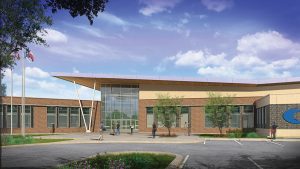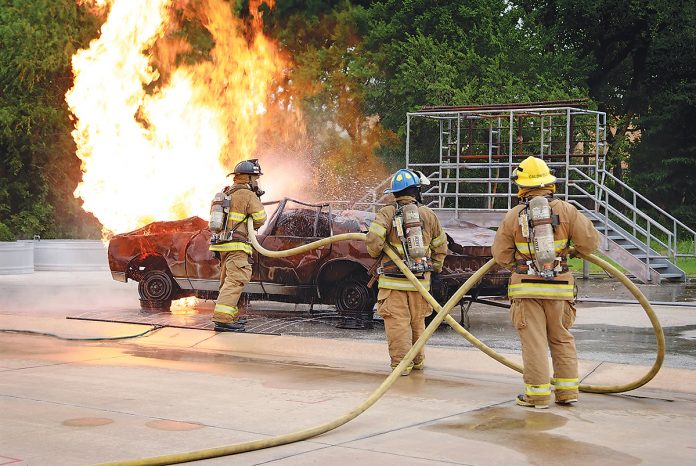Public safety in the 21st century is a rapidly-changing and evolving space. Over the past two decades, law enforcement and fire and rescue service personnel have faced a massive shift in thought processes and best practices, moving from being reactive and responsive to predictive and preventative. Today, cities cannot wait until a catastrophe occurs to take action. Instead, they must attempt to foresee a situation with real-time awareness and proceed with a course of action. Indeed, hands-on training is one of the most important functions a city uses to ensure public safety personnel become proficient at their jobs, with the ultimate result of protecting the community.
Partnering with the Cities of Allen and McKinney, Collin College has envisioned and now is implementing the solution — its Public Safety Training Center. Recently celebrating the official groundbreaking, the safety and training facility will serve as the new home for Collin College’s fire science and law enforcement academies, providing expanded training and professional development opportunities for local fire departments, law enforcement agencies, public safety personnel and students.
Dr. Neil Matkin, the Collin College district president, explains, “Our new Public Safety Training Center is a result of our community and leaders understanding a problem, working together and implementing great vision. With this state-of-the-art facility, our goal is to serve our students in the best possible way while expanding training opportunities in fire safety and law enforcement and providing diverse simulations within the facility. We are so proud to join with our city partners to create this fantastic solution. It will help make us all safer.”
In spring 2015, Dr. Matkin arrived at Collin College and found his board members stymied, trying to decide a location for the public safety training center. Several members believed Melissa was the appropriate choice for the new development, while others wanted the site to be in McKinney. After some research and deliberation, the group collectively determined the Public Safety Training Center’s home would be located in McKinney, as this location serves students and various partner cities best. This central location also provides students and trainees the opportunity to respond in emergency situations within their own service area, allowing even more training and educational opportunities.
Dr. Matkin continues, “Collin College currently offers continuing education on seven different campuses. This center will be location number eight. As a whole, our campuses are greatly concerned about safety, and our goal with this center is to fully prepare fire fighters and police officers in our immediate communities while also educating a number of clients outside of Collin County, including North Texas, Okla. and well south of the metroplex.”
Sitting atop 25 acres of land just a few blocks east of U.S. Highway 75, near the corner of Redbud Boulevard and Bloomdale Road, the approximately 128,000-square-foot facility will host a number of technological elements and advanced degrees and certifications for both fire rescue and law enforcement. Collin College’s Fire Science Academy will offer an associate of applied science for basic firefighter certification, a basic firefighter certificate, an associate of applied science for fire officer certification and a fire officer certificate. Collin College’s Law Enforcement Academy will provide a basic peace officer certification, a basic correctional officer state licensure course and a basic telecommunications state licensure course. Continuing educational courses for local, state and federal public safety employees will also be offered.
From the fire rescue perspective, some of the methodologies to fight fire have changed, but generally, the types of buildings themselves have not. In that sense, Collin College’s Public Safety Training Center will include two multi-story burn buildings for fire training, which will simulate fire suppression and rescue in residential and commercial settings, as well as a designated area for training on hazardous materials, fires and spills. The facility will also include specialized simulators and several props for training in hazardous materials, fires and spills, civil aircraft fires and below-grade rescue in earth collapse extrications. Ultimately, these features will help students and trainees prepare and adapt for evolving and changing fire and hazardous scenarios.
Within the law enforcement arena, a much different cultural environment presents itself today, with evolving complex situations that must be addressed immediately and effectively. With this understanding, the facility will allow students and trainees to proactively predict and respond with real-time situational awareness as a potential event unfolds. These features include a 10,000-square-foot reality-based training center for Allen and McKinney police officers, complete with simulated retail spaces, office buildings and living areas. The center will offer virtual reality training and will house three indoor firearm ranges, including an extra-large, 53,000-square-foot, 37-lane firearm range. The design would not be complete without the center’s dedicated defensive tactics room and nine detailed classrooms with support facilities. “The center’s walls are portable and can be simulated to different environments, as well as vehicle situations,” adds Ken Lynn, Collin College’s CFO. “We also think it is pretty rare for a center to offer an indoor 100-yard rifle range, and currently, in this area, there is not another one available. So, I can assure you that our municipal and area police forces are anxious and eager to try it.”
 Ground was broken for the facility in early April of this year. The center is an optimal example of multiple cities and organizations partnering together to build a collaborative solution, not only ideal for the Cities of McKinney and Allen, but also Collin College and the community at large. Recently, voters approved Collin College’s $600 million bond proposal, facilitating long-range plans to accommodate the projected population growth in Collin County over the next two decades. “We are incredibly grateful for the community’s support of our future vision and we certainly do not take this approval for granted,” explains Dr. Matkin. “Our master plan will now become a reality, allowing us to serve more students, residents and businesses than ever before. With the Cities of McKinney and Allen’s investments, this center is an extraordinary example of separate entities coming together to build a solution that benefits the community and, ultimately, the taxpayers.”
Ground was broken for the facility in early April of this year. The center is an optimal example of multiple cities and organizations partnering together to build a collaborative solution, not only ideal for the Cities of McKinney and Allen, but also Collin College and the community at large. Recently, voters approved Collin College’s $600 million bond proposal, facilitating long-range plans to accommodate the projected population growth in Collin County over the next two decades. “We are incredibly grateful for the community’s support of our future vision and we certainly do not take this approval for granted,” explains Dr. Matkin. “Our master plan will now become a reality, allowing us to serve more students, residents and businesses than ever before. With the Cities of McKinney and Allen’s investments, this center is an extraordinary example of separate entities coming together to build a solution that benefits the community and, ultimately, the taxpayers.”
Planned for completion in May 2018, the Public Safety Training Center’s grand opening is sure to be something special. Indeed, Collin College leaders are discussing how to offer a special preview open house for area firemen and women and police offers within a 100-mile radius of the center. “It is important to honor the men and women who put their lives on the line for our communities and citizens, day in and day out. However, we have not figured it out yet,” he notes. “One thing I do know is that our center understands the importance of safety and the role it plays in our community. Whatever we do, it will be a magnificent event. They deserve it.”


